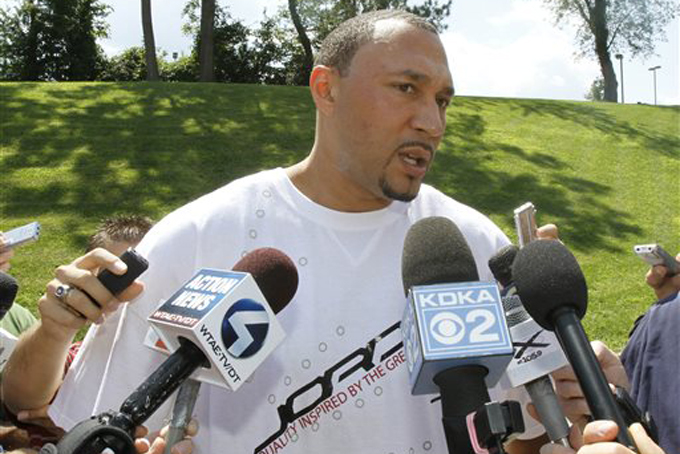
NEW YORK (AP) – Approaching the end of his dozen seasons as an NFL quarterback, Charlie Batch felt comfortable about moving on to another career.
He’s a rarity.
Batch, other players, their union and the league itself recognized the need for help in not only adjusting to the world outside of football, but surviving in it. So one of the most positive aspects of the labor agreement that ended the 2011 lockout was the creation of The Trust.
Officially launched in November 2013, The Trust began with a $22 million budget that will increase annually by 5 percent through the end of the current CBA in 2021.
The funding for The Trust is money taken off the salary cap each year and allocated for former player benefits and services. It’s overseen by its executive director, Bahati Van Pelt, and provides resources for former players to take care of brain and body health; career transition; entrepreneurship; education; financial literacy; and personal interaction.
“From the players’ standpoint, they wanted to help the transition for anyone leaving the league,” Batch said. “The average NFL career is only three years, so at some point we will be a former a lot more than an active player.
“This is something the players have earned and it is there for them. There are between 15,000 and 16,000 former players, and more each year. We’re making sure we can reach these guys and making sure they know we can help you.”
That help pretty much covers the gamut of post-NFL concerns. Through partnerships with the Cleveland Clinic, Massachusetts General Hospital, Tulane and North Carolina universities, medical care is offered – at no charge to the ex-player.
A working relationship with Babson College focuses on entrepreneurship. Athlife helps with career guidance, SCORE with growing a business and mentorship. EXOS provides consultations on health and habits, nutrition, physical therapy and performance.
Financial Finesse offers guidance on handling money, while Hillard Heintze helps Trust members identify and evaluate risks in business. The scholarship program offers exactly that – tuition payments for former players returning to school.
More than 1,200 former players took advantage of programs and counseling in the first year of The Trust. One of them, Greg Camarillo, was mostly a backup receiver for four teams in seven pro seasons before leaving the NFL in 2012.
Did he know what was next?
“I had no idea,” he says. “Every offseason I would try to pursue some sort of career interest. I was an undrafted guy, every year could have been my last year, and I felt the pressure every time cuts came around. I spent months trying to figure out what my next move was.”
He found out about The Trust and signed up for the full body health assessment, which he says was the first unbiased doctor’s opinion he felt he got since his NFL debut in 2006. He’d sustained two diagnosed concussions as a player and noticed signs of post-concussion syndrome (headaches, memory issues) toward the end of his playing days.
“Finding out all my baselines were OK was a huge sense of relief,” he says of the testing at Tulane. “It was the most thorough (physical examination) I have been through. It is not for a team, it is for you. It doesn’t go to any doctor unless you ask to send it to any doctor.”
Camarillo now is using the scholarship program toward a master’s degree in educational leadership and will graduate in May from San Diego State.
The Trust grants $20,000 up front to ex-players using the program. The NFL also has a tuition reimbursement in which former players lay out money and then apply for remuneration.
Players also can use the scholarship program for vocational degrees or professional certifications.
“We have a $2 million fund set up for it,” Van Pelt says, noting $1.36 million was used in the first year.
“We verify the institutions – we don’t want any unaccredited schools or programs – and help them find the best places to go for their purpose. We also monitor the costs to make sure they are not out of the norm for whatever the former player is pursuing in his further education.”
Babson College in Massachusetts, the top-rated entrepreneurship specialty college for two decades, is one of the founding partners of The Trust. Former players are offered two residency programs: It’s My Business, with classes consisting of about two dozen people over a span of 2 1-2 days; and a higher-lever Entrepreneurs Boot Camp, which lasts a week.
“The first level program is to give them a notion whether this is something they are interested in,” says Fred Nanni, the school’s provost and the program’s faculty director. “If they do want to pursue this, we make it pretty clear it is not something that will happen quickly. Maybe they need to put a year in before going to look for funding from elsewhere for their businesses.”
Level 2 is the next step. A third step is being planned, but would be only for when the former player’s business is running smoothly.
Batch has run his own foundation for 15 years. The Best of the Batch Foundation, based in his hometown of Pittsburgh, develops after-school programs, scholarships for students, restores playgrounds, and offers sports and leisure activities to youngsters.
In helping pioneer The Trust, he recognized how it could fill a huge void.
“Every player goes through a transition differently,” he says. “The Trust is way overdue. When players leave the game there is no personal touch, they do not know where to go. The Trust helps them with where to go, where to get the outreach, and how to succeed after football.”
___
AP NFL website: www.pro32.ap.org and www.twitter.com/AP_NFL